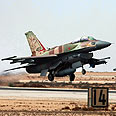
S. Arabia: We'll intercept any IAF aircraft en route to Iran
US officials transmit message from Riyadh saying any Israeli aircraft crossing its airspace en route to Iran will be shot down. Israeli officials claim Saudi threat is yet another American attempt to foil strike
More obstacles? Saudi Arabia has informed Israel that it would intercept any Air Force aircraft crossing its airspace en route to Iran, Yedioth Ahronoth reported on Thursday.
The explicit message was transmitted via the United States, during talks with Obama administration officials in Jerusalem.
Related stories:
- Op-ed: Nuclear Iran has its advantages We'll pay heavy price for mistake in Iran Israeli officials slam Obama's 'wretched' Iran red line
Senior Israeli officials have claimed that the Americans are leveraging the Saudi threat in an attempt to dissuade Israel from launching a unilateral offensive on Iran's nuclear facilities. Some sources estimate that Saudi Arabia, which is equipped with American-made fighter jets, would have allowed Israel to cross its airspace if the latter would have coordinated its military operation with the White House.
Meanwhile, The New York Times has claimed that Israel will prefer to use a direct route that passes over Jordan and Iraq. Foreign commentators have estimated that the Jordanians will turn a blind eye, yet others have said that Amman might consider the act a breach of its peace accord with Israel. Two other possible routes are over Turkey and Syria, or a longer route along the Red Sea.
Last week, Yedioth Ahronoth reported that the US would only be prepared to carry out a strike against Iran in 18 month, when a "critical threshold" was crossed, and was resolutely against an Israeli strike.
Regional Cooperation
While Washington is trying to stall any military attack against Iran, The New York Times reported on Wednesday that the United States was pushing its Gulf allies to set up a regional missile defense system aimed at protecting strategic areas including military bases and infrastructure from an Iranian attack.
US Secretary of State Hillary Clinton told representatives from Bahrain, Kuwait, Oman, Qatar, Saudi Arabia and the United Arab Emirates that the more can be done "to defend the gulf through cooperation on ballistic missile defense.
"Sometimes to defend one nation effectively you might need a radar system in a neighboring nation," she said, adding, "But it’s the cooperation — it’s what they call ‘interoperability’ — that we now need to really roll up our sleeves and get to work on."
The report stated that unlike the regional missile defense system in Europe, "the Persian Gulf effort is mostly behind the scenes — and on a country-by-country basis — with billions of dollars in arms sales negotiated bilaterally between the United States and nations in the region."
Therefore, America's challenge will be to convince the Gulf countries to "set aside their rivalries and share early warning radar data, and then integrate the capabilities of their unilateral missile interceptor systems to extend defenses over the entire region."
- Receive Ynetnews updates directly to your desktop










